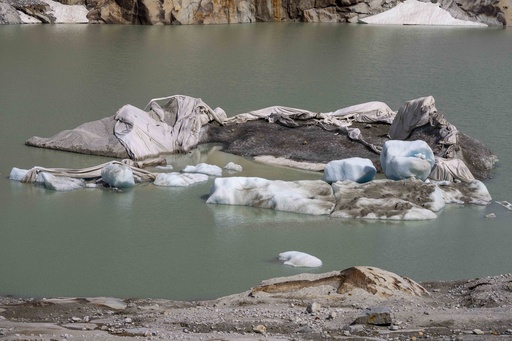Recent research indicates that climate change is rapidly accelerating the melting of the world’s mountain glaciers. A significant study published in this week’s *Nature* journal reveals that glaciers are now shrinking more than double the rate they did in the early 2000s.
From 2000 to 2011, the world’s glaciers were losing ice at approximately 255 billion tons (231 billion metric tons) per year. However, this loss accelerated to around 346 billion tons (314 billion metric tons) annually over the next decade. Incredibly, the latest statistics show that glacier loss hit a record high of 604 billion tons (548 billion metric tons) in 2023, marking a continued increase in melting rates.
The extensive study involved an international collaboration that produced 233 assessments regarding glacier weight changes. Since the year 2000, glaciers have collectively lost over 7 trillion tons of ice (6.5 trillion metric tons). Glaciologist William Colgan from the Geological Survey of Denmark and Greenland noted that while it is known glaciers are receding, the speed of this loss shows a troubling acceleration.
Among the various global regions studied, glaciers in Alaska are experiencing the fastest rate of melting, losing about 67 billion tons (61 billion metric tons) of ice annually. In contrast, Central Europe’s glaciers have diminished significantly, now being 39% smaller than they were in 2000, making them the region with the highest percentage of ice loss over the last 24 years. Colgan expressed particular concern for the Alps, highlighting that rising summer temperatures are severely affecting these glaciers.
While scientists once worried most about the glaciers of the Andes and Patagonia, they now fear the same fate could befall the Alps if the current trends continue. Gwenn Flowers, a professor of Earth Sciences at Simon Fraser University in Canada, emphasized that glaciers serve as impartial indicators of climate change, clearly illustrating the consequences of accelerated warming.
Ted Scambos, an ice scientist from the University of Colorado, pointed out that glaciers have historically gone through cycles of shrinking and expanding due to well-understood reasons that are not related to climate change. However, he insisted that the current situation is distinctly linked to the rise in greenhouse gases from fossil fuel combustion, stating that rhetoric or declarations won’t alter this stark reality.
The assessments from Scambos, Flowers, and other experts are both alarming and accurate, though not unexpected. Colgan also noted that many regions in the western U.S. currently benefit from the additional water supplied by rapidly melting glaciers. However, this situation is temporary and will quickly change once glaciers deplete beyond a certain threshold.
Interestingly, melting glaciers are now contributing more to sea-level rise than the losses occurring in either Greenland or Antarctica, with water expansion from warming being the only greater factor influencing sea rise. While the recent assessment of glacier loss aligns with earlier studies, it is likely to prompt even more pessimistic projections moving forward, driven by better data and increasing temperatures.
Colgan highlighted the urgency of the situation, stating, “If you’re losing 5.5% of the global ice volume in just over 20 years, clearly that’s not sustainable.” He cautioned that what may seem like unprecedented glacier loss currently could soon become common if trends persist.
Given the current rate of more than 600 billion tons of glacial ice loss, Colgan remarked that it sounds astonishing now, but it could easily become the norm in a decade. He stressed that the collective ice loss among mountain glaciers could intensify rapidly in the near future.
